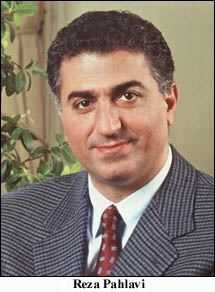 |
| Vol. 3 No. 11 | Table of Contents MEIB Main Page | November 2001 |
| | Interview: Reza Pahlavi former Crown Prince of Iran |
Reza Pahlavi, the son of the former Shah of Iran, has emerged as a leading figure in the Iranian opposition abroad since the 1979 Iranian revolution, advocating nonviolent resistance to the regime in Tehran and the establishment of a secular democracy. He is a familiar figure in many Iranian homes, due to Persian language satellite television broadcasts beamed in from Los Angeles.
The following interview was conducted by Amir Arsalan Afkhami, a Ph.D candidate in History at Yale University and medical student at George Washington University. Afkhami has been a contributor to the Journal of Iranian Studies, Comparative Studies of South Asia, Africa and the Middle East, and Encyclopedia Iranica. He is currently completing his dissertation, entitled "Iran in the Age of Visitations: Cholera and the Politics of Public Health 1889-1911."
 |
 |